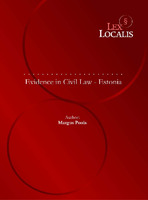Evidence in Civil Law - Estonia
| dc.contributor.author | Poola, Margus | |
| dc.date.accessioned | 2016-11-29 00:00:00 | |
| dc.date.accessioned | 2020-04-01T13:55:49Z | |
| dc.date.available | 2020-04-01T13:55:49Z | |
| dc.date.issued | 2015 | |
| dc.identifier | 620452 | |
| dc.identifier | OCN: 945783097 | en_US |
| dc.identifier.uri | http://library.oapen.org/handle/20.500.12657/31984 | |
| dc.description.abstract | Since Estonia regained its independence on 20 August 1991 Estonian civil procedure has been gradually developed from the civil procedure of Estonian SSR to the modern civil procedure rules in force today. The current code of civil procedure was adopted on 20 April 2005 and came into force in 1 January 2006. Since coming into force several changes have been made to the current code with significant changes coming into force on 1 January 2009. Estonian civil procedure is mainly based on the adversarial principle, except for some specific cases and proceedings on petition where the inquisitorial principle is used. Deriving from this the parties are in most cases free to decide on what evidence to submit and whether to submit evidence at all. While the court may ask the parties to submit evidence, they are not required to do so. The situation is different in cases based on the inquisitorial principle. Estonian civil procedure does not impose many restrictions as to the kind of evidence that can be submitted. Virtually anything that can be reproduced in some way may be submitted as documentary evidence and any person who has knowledge about the facts of the case may be heard as a witness. Even the parties may be heard under oath. The Estonian Code of Civil Procedure does not set out many rules on how to evaluate the evidence submitted. The basic rule is that the court has to assess the evidence impartially and as a whole and not give any preference to any particular piece of evidence. | |
| dc.language | English | |
| dc.relation.ispartofseries | Law & Society | |
| dc.subject.classification | thema EDItEUR::J Society and Social Sciences::JP Politics and government::JPH Political structure and processes | en_US |
| dc.subject.other | civil procedure | |
| dc.subject.other | gathering of evidence | |
| dc.subject.other | international civil procedure | |
| dc.subject.other | private international law | |
| dc.subject.other | estonia | |
| dc.subject.other | procedural costs | |
| dc.subject.other | Communist Party of China | |
| dc.subject.other | Defendant | |
| dc.subject.other | Digital signature | |
| dc.subject.other | Judiciary of Russia | |
| dc.subject.other | Lawsuit | |
| dc.subject.other | Letters rogatory | |
| dc.subject.other | Plaintiff | |
| dc.subject.other | Supreme court | |
| dc.title | Evidence in Civil Law - Estonia | |
| dc.type | book | |
| oapen.identifier.doi | 10.4335/978-961-6842-39-6 | |
| oapen.relation.isPublishedBy | cfc0db17-9c85-40be-996a-12c7cc16b807 | |
| oapen.relation.isbn | 9789616842396 | |
| oapen.pages | 69 | |
| oapen.remark.public | Relevant Wikipedia pages: Civil procedure - https://en.wikipedia.org/wiki/Civil_procedure; Communist Party of China - https://en.wikipedia.org/wiki/Communist_Party_of_China; Defendant - https://en.wikipedia.org/wiki/Defendant; Digital signature - https://en.wikipedia.org/wiki/Digital_signature; Estonia - https://en.wikipedia.org/wiki/Estonia; Judiciary of Russia - https://en.wikipedia.org/wiki/Judiciary_of_Russia; Lawsuit - https://en.wikipedia.org/wiki/Lawsuit; Letters rogatory - https://en.wikipedia.org/wiki/Letters_rogatory; Plaintiff - https://en.wikipedia.org/wiki/Plaintiff; Supreme court - https://en.wikipedia.org/wiki/Supreme_court | |
| oapen.identifier.ocn | 945783097 |

